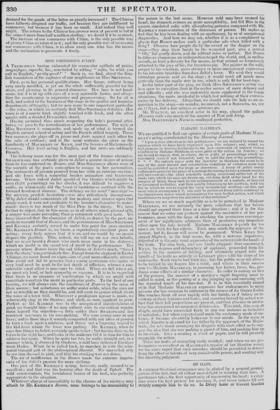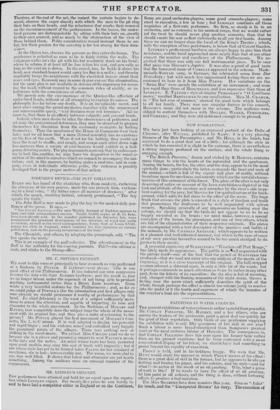OF HATS.
A COMMON theatrical annoyance may be abated by a general promul- gation or the fact, that all vulgar men delight in wearing their hats. A gentleman takes the first opportunity of uncovering his head a vulga- rian seizes the first pretext for covering it, and never unhats till rule strictly compels him to do so. In Drury Lane or Covent Garden Theatres, at the end of fhe act, the instant the curtain begins to de- scend, observe the eager alacrity with which the men in the pit clap their hats on their heads, and the reluctance that marks their removal on the recommencement of the performance. In the boxes, the under- bred persons are distinguishable by sitting with their hats on, greatly to their own content, and as much to the obstruction of the view of those behind them. Polite consideration would instruct them to un- hat, but their passion for the covering is far too strong for their bien- seamy,.
At the Opera too, observe the persons as they enter the house. The gentleman is unhatted as soon as he is fairly within the walls. The vulgarian walks into the pit with his hat resolutely stuck on his head ; where he retains it at least till he has taken his seat, and generally as lone as the curtain is down. In the crowd, too, he holds it above his head, as a standard-bearer would carry Ins flag in a melee; and thereby unpitiably bangs his neighbours with the cherished beaver about their noses and eyes. Economy may in some degree excuse this abomination, but the same plea is not available in defence of the eagerness for cover- ing the head, without regard to the common rules of civility, or in- terference with the convenience of others.
We merely note the circumstance of the Quaker-like affection of under-bred heads, without at all attempting to explain its causes. The philosophy lies far below our depth. It is an inexplicable secret, and must class among the grand mysteries, togetherwith the unanswered and unanswerable query, "why dustmen wear red breeches." All we know is, that there is an affinity between v ulearity and covered heads. Indeed, when men desire to relax the observances of politeness, and set aside the conventional deferences, they may be observed to prepare themselves for liberation from the customary restraints by hating themselves. Thus the members of the House of Commons wear their hats ; and we all know that a more ill-bred assembly has no existence on the face of the earth. Were it not for the hafting, they would not have the heart. to shuffle, and cough, and scrape each other down with less manners than a society of coal-heavers would exhibit in a half- penny debuting society. The physiognomists contend, that by endeavour- ing to look like,another, we may trace his disposition in the mood or motion of 1 he mind in ourselves which we remark to accompany the imi- tation; and, in like manner, by batting under a roof-tree, and in com- pany. even in individuals otherwise polite, the rudeness is possibly developed that is the proper motive of that action.



















 Previous page
Previous page